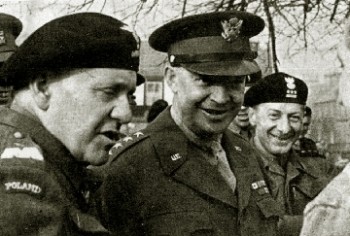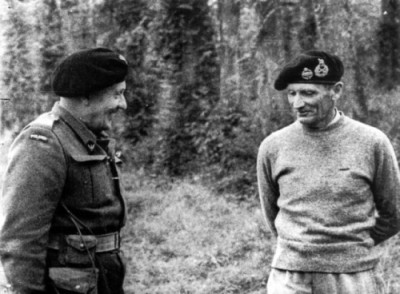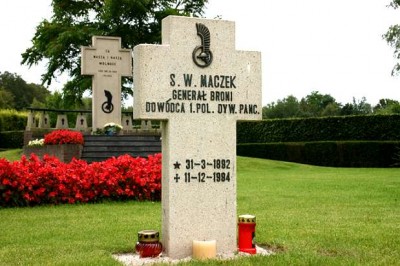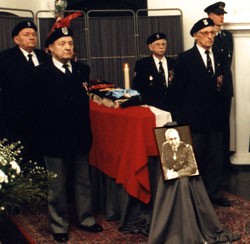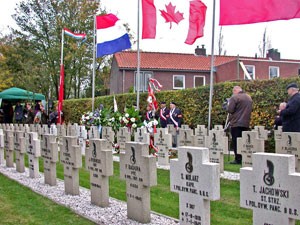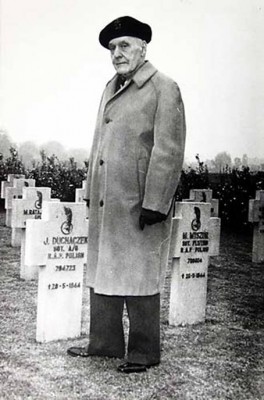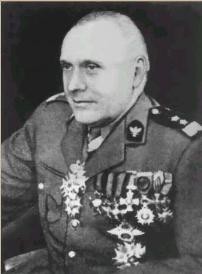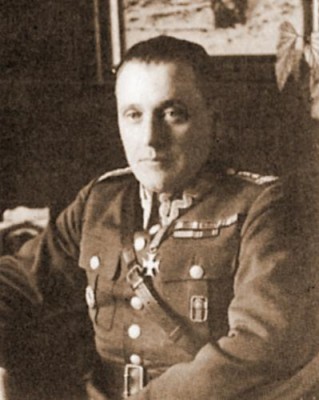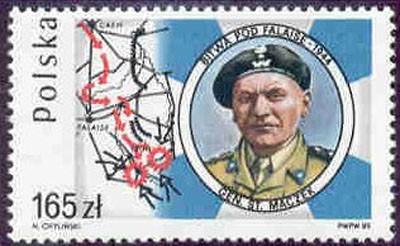| Příjmení: Surname: | Maczek | Maczek |
| Jméno: Given Name: | Stanisław | Stanisław |
| Jméno v originále: Original Name: | Stanisław Maczek | |
| Fotografie či obrázek: Photograph or Picture: | | |
| Hodnost: Rank: | generálporučík | Lieutenant General |
| Akademický či vědecký titul: Academic or Scientific Title: | - | - |
| Šlechtický titul: Hereditary Title: | - | - |
| Datum, místo narození: Date and Place of Birth: | 31.03.1892 Szczerzec | 31.03.1892 Szczerzec |
| Datum, místo úmrtí: Date and Place of Decease: | 11.12.1994 Edinburgh | 11.12.1994 Edinburgh |
| Nejvýznamnější funkce: (maximálně tři) Most Important Appointments: (up to three) | - velitel 1. obrněné divize | - Commander of the 1st Polish Armoured Division |
| Jiné významné skutečnosti: (maximálně tři) Other Notable Facts: (up to three) | - | - |
| Související články: Related Articles: | | |
| Zdroje: Sources: | http://en.wikipedia.org/wiki/Stanis%C5%82aw_Maczek | |
Maczek, Stanisław
| Příjmení: Surname: | Maczek | Maczek |
| Jméno: Given Name: | Stanisław | Stanisław |
| Jméno v originále: Original Name: | Stanisław Maczek | |
| Všeobecné vzdělání: General Education: | DD.MM.RRRR-DD.MM.RRRR | DD.MM.RRRR-DD.MM.RRRR |
| Vojenské vzdělání: Military Education: | DD.MM.RRRR-DD.MM.RRRR | DD.MM.RRRR-DD.MM.RRRR |
| Důstojnické hodnosti: Officer Ranks: | DD.MM.1916 podporučík DD.MM.1918 poručík DD.MM.1919 kapitán DD.MM.1921 major 01.12.1924 podplukovnik 01.01.1931 plukovník 15.11.1939 brigádny generál 01.06.1945 generálmajor 11.11.1990 generálporučík | DD.MM.1916 Second Lieutenant DD.MM.1918 Lieutenant DD.MM.1919 Captain DD.MM.1921 Major 01.12.1924 Lieutenant Colonel 01.01.1931 Colonel 15.11.1939 Brigadier General 01.06.1945 Major-General 11.11.1990 Lieutenant General |
| Průběh vojenské služby: Military Career: | | |
| Vyznamenání: Awards: | ||
| Poznámka: Note: | - | - |
| Zdroje: Sources: | http://en.wikipedia.org/wiki/Stanis%C5%82aw_Maczek pl.wikipedia.org | |
Reklama
Lieutenant General Stanisław Maczek
(31. 3. 1892 Szczerc - 11. 12. 1994 Edinburgh)
Youth
Stanisław Maczek was born to a Polish family in the Lvov region on 31 March 1892. After graduating from the gymnasium in Drohobycz, he began his studies at the University of Lviv in 1910. Under the tutelage of the outstanding Polonists and philosophers of the time, he studied his beloved Polish philology at the philosophy department and became interested in the psychology of feelings in literature - an original preparation for life for the future philosopher-philosopher... The young student Maczek has his first encounter with a gun at the shooting association. During his studies, he is actively involved in Polish patriotic associations operating in academic circles.
World War I
The First World War drastically changes the young philosopher's plans. In 1914, Maczek is drafted into the Austrian army. He is assigned to the mountain riflemen and attains the rank of second lieutenant. After graduating from non-commissioned officer school, he is transferred to the 3rd Infantry Regiment in Graz. In June 1915 he is transferred to the elite 2nd Tyrolean Imperial Rifle Regiment.
With his Tyrolean regiment he took part in the fighting on the Halych front. In December 1915, Maczek's regiment was transferred to the Italian front. From this period, Maczek gained experience of fighting in mountainous terrain and, as he recalls, often used this experience during later battles in the Carpathians or Normandy.
After the signing of the Armistice, Maczek immediately deserted and went to Krosno where he joined the nascent Polish Army on 14 November 1918.
Polish-Russian War
In 1918-1920 he participates in the Polish-Ukrainian and Polish-Bolshevik wars. In 1919 he took command of the so-called "lotna kompania" in the 4th Infantry Division. Maczek's company is composed on the model of German assault battalions, equipped with more vehicles and stronger firepower. It was then that Maczek first demonstrated his talent and flair for commanding mobile, heavily armed units, which he would later fully demonstrate during World War II.
After the end of the Polish-Ukrainian fighting, Maczek, at the rank of major, was assigned to staff duties. The staff work, though interesting, was not satisfying and he was drawn back to the field. After the start of the Polish-Bolshevik War, he reestablished his assault battalion, with which he took part in the defence of Lvov.
Between the World Wars
In the interwar period, Maczek remains in the army. In August 1923, he is promoted to lieutenant colonel and serves with the 26th Infantry Regiment in Lviv. In 1923-1924, he completes a one-year refresher course at the military college in Warsaw. After completing the course, in October 1924, he is assigned to the General Staff of the Polish Army. In the following years, he served his apprenticeship as deputy commander of the 76th Infantry Regiment, and then received a nomination for the post of commander of the 81st Regiment of the Grodzien Rifles, which he held until 1935. His superior and role model during this period was General Franciszek Kleeberg. But as he later wrote, he learned mainly from his "little subordinates" - simple soldiers. If Commander Maczek undertook something, he always did it from the ground up and honestly. He was convinced that psychology does not change in any way; regardless of technical progress, one always commands a normal, living man "who is only sometimes, thanks to special circumstances, raised to the heights of heroism." He always thought mainly of the ordinary, average soldier.
In 1938, Colonel Maczek was given command of the 10th Cavalry Brigade - the first Polish motorised unit. At the time, he had no idea that it was with this unit that he would forever link his military life. It was with it that he would go through three war campaigns: the September 1939 campaign, the French 1940 campaign and the Allied 1944-45 campaign.
He was received enthusiastically at his new post - his name and reputation for "his" assault battalions opened doors with his superiors when he came up with ideas for modernising the unit. The brigade was traditionally a cavalry unit, but in reality it was an armoured - motorised unit, numbering 600 machines. Under Maczka's command it quickly became the pride of the Polish army, setting an example both in training and in exemplary military relations.
September 1939 Campaign
The German attack on Poland on 1 September 1939 caught the brigade in an unfortunate period of restructuring and personnel changes. This left the brigade depleted of a third of its tank and artillery equipment. Despite these difficulties, the 10th Cavalry Brigade took part in the retreat battles in southern Poland as part of the Kraków and Karpaty armies. From 15 September, Maczek takes part in the defence of Lvov - as in 1920, but this time not against the Soviet but against the German occupiers.
On September 17, 1939, Red Army troops enter Poland to liberate and protect the Belarusians and Ukrainians living in eastern Poland from their Polish masters. On the same day, under orders from Colonel Maczek, the 10th Cavalry Brigade crossed the Polish-Hungarian border.
Francie 1939-1940
After a brief internment in Hungary, Maczek escapes to France, where he reports to General Sikorski on 21 October 1939. He is warmly welcomed and, as a reward for his services in the September campaign, is promoted to the rank of general and offered the post of commander of the 1st Grenadier Division - the first Polish unit formed abroad. General Maczek declines this honorary post. Looking out for the soldiers of his 10th Brigade, slowly streaming into France, he took command of the Polish Army training centre in the town of Coёtquidan.
Slowly he managed to reactivate the 10th Brigade and in 1940 he was finally able to take command of the 10. Brigade Motorisee Polonaise - a Polish unit defending France from the German occupiers. For every gun or car, the general had to fight a tough battle with the arrogant French. Full of pride, the French were confident of their Maginot Line and regarded the Polish unit as unnecessary...
After German aggression in June 1940, the 10th Armoured Cavalry Brigade fought alongside French troops. On the night of 16-17 June, near the town of Montbard, the unit is surrounded by German tank units. Unable to continue in straight combat, the general issues an order to destroy the armour and orders the troops to break through to the unoccupied part of France. After the surrender of France, Gen. Maczek, along with about five hundred other soldiers, takes refuge in Marseilles.
Skotsko 1940-1944
Disguised as an Arab, he sails to Tunis and from there, via Morocco, Portugal and Gibraltar, arrives in Scotland on 21 September 1940. Soon afterwards he took command of the 2nd Rifle Brigade, later renamed the 10th Armoured Cavalry Brigade. In October 1940 he is awarded the Gold Cross Virtuti Militari for his actions in France. For Maczek, the situation familiar from France repeats itself, as he reassembles the brigade, must overcome the problems associated with British mistrust, and once again eagerly awaits the arrival of his troops in the British Isles.
In February 1942 it was decided to form the 1st Armoured Division under the command of General Maczek. The division was not the first in name only, but the first ever real, tank division in the Polish Army.
The 1st Armoured Division in its early days defended a 200-kilometre stretch of the Scottish coastline against a possible German attack. During this service the division was gradually replenished until it reached a strength of 16,000 troops, 381 tanks, 473 guns and 5,060 assorted vehicles.
Fighting in Europe 1944-1945
On 1 August 1944, Maczek's 1st Armored Division began its combat journey on the European continent. It entered action as part of the 1st Canadian Army during Operation Totalise. Maczek earned universal acclaim for his skillful leadership during the Battle of Falaise, where it was the 1st Armoured Division's daring manoeuvres that helped close the cauldron of encirclement. After the successful action, General Montgomery said: the Germans were like a bottle, and the Polish Division was the cork with which we closed them. As a point of interest, at Falaise the "Maczek's" met the units they first fought against at the Battle of Wysoka in September 1939. The 1st Armored Division continued on in the direction of Belgium, liberating the towns of Ypres, Passchendale, Roulers, Thielt. An important point on its combat route is the Dutch city of Breda. Here Maczek, who always took care not to endanger his soldiers unnecessarily, suffered heavy losses. Perhaps that is why he considered Breda his ultimate strategic victory on the one hand, but on the other hand the place where he said goodbye to many comrades in arms. He always tried not to destroy the towns he liberated, for which he earned the gratitude of thousands of locals. He later asked to be buried among his comrades in the Polish war cemetery in Breda.
While in Breda, the outcome of the Yalta Conference reached the Polish soldiers. Maczek and a large number of soldiers from the original 10th Cavalry Brigade came from the eastern parts of Poland. With the Yalta decision, their beloved homes were suddenly behind the Curzon Line and therefore in the Soviet Union. Anger, disappointment and a sense of betrayal by the Allies overwhelmed the unit, but nevertheless the determination to beat the hated enemy did not break and the division continued to fight on.
Its last stage was the German port of Wilhelmshaven, where the garrison of the Kriegsmarine fortress and base, the Ostfrisland fleet, surrendered to the general.
Emigration
General Maczek, an educated and intelligent man, understood what might await a famous general returning from the West in post-war communist Poland. Since September 19, 1939, he had been looking forward to returning to his beloved homeland, but when the opportunity arose he rejected it. In retaliation, he was stripped of his Polish citizenship in September 1946. In this way, the communists thanked the soldier for his heroism and hard service for his country...
The general promised then that he would never return to his homeland. He correctly recognized that Poland had become, thanks to the treachery of the Allies, a mere Soviet satellite. Maczek settled in Edinburgh. As he was not entitled to a British pension (short service in the British army) and Poland had disinherited him, he took a job as a barman at the Learmouth Hotel. The bar soon became a meeting place for Polish soldiers who shared a similar fate to the General. Maczek did not grieve, he remained optimistic and always found a smile for his former soldiers, who always greeted him with a military salute and knocked-off heels. He was not involved in the political life of the Polish emigration abroad. However, he served for many years as chancellor of the exiled Chapter of the Valois Order of Virtuti Militari. He wrote his war memoirs in a book of war memories, which was published in 1960 and only in London, but readers in Poland had to wait until 1990.
In 1992, on the occasion of his 100th birthday, he was promoted to the rank of general of arms, and in 1994 he received Poland's highest state decoration, the Order of the White Eagle
General Stanisław Maczek - a three-time recipient of the Virtuti Militari War Order and dozens of other decorations - died in Edinburgh on 11 December 1994 at the age of 102. According to his wishes, he was buried among his soldiers in the Polish military cemetery in Breda, the Netherlands.
Polski żołnierz walczy o wolność innych narodów, lecz umiera zawsze z myślą o Polsce
(Polish soldier fights for the freedom of other nations, but always dies thinking of Poland)
Gen. Maczek
Resources:
Tadeusz Wysocki, 1st Polish Armoured Division 1939-1947. Geneza i dzieje, Warszawa 1994, ISBN 83-11-08219-7
Stanisław Maczek, Od podwoda do czołga. Wspomnienia wojenne 1918-1945, Warsaw 1990, ISBN 83-04-03659-2
Jerzy Majka, Stanisław Maczek, Libra 2005 ISBN 83-89-18310-2
(31. 3. 1892 Szczerc - 11. 12. 1994 Edinburgh)
Youth
Stanisław Maczek was born to a Polish family in the Lvov region on 31 March 1892. After graduating from the gymnasium in Drohobycz, he began his studies at the University of Lviv in 1910. Under the tutelage of the outstanding Polonists and philosophers of the time, he studied his beloved Polish philology at the philosophy department and became interested in the psychology of feelings in literature - an original preparation for life for the future philosopher-philosopher... The young student Maczek has his first encounter with a gun at the shooting association. During his studies, he is actively involved in Polish patriotic associations operating in academic circles.
World War I
The First World War drastically changes the young philosopher's plans. In 1914, Maczek is drafted into the Austrian army. He is assigned to the mountain riflemen and attains the rank of second lieutenant. After graduating from non-commissioned officer school, he is transferred to the 3rd Infantry Regiment in Graz. In June 1915 he is transferred to the elite 2nd Tyrolean Imperial Rifle Regiment.
With his Tyrolean regiment he took part in the fighting on the Halych front. In December 1915, Maczek's regiment was transferred to the Italian front. From this period, Maczek gained experience of fighting in mountainous terrain and, as he recalls, often used this experience during later battles in the Carpathians or Normandy.
After the signing of the Armistice, Maczek immediately deserted and went to Krosno where he joined the nascent Polish Army on 14 November 1918.
Polish-Russian War
In 1918-1920 he participates in the Polish-Ukrainian and Polish-Bolshevik wars. In 1919 he took command of the so-called "lotna kompania" in the 4th Infantry Division. Maczek's company is composed on the model of German assault battalions, equipped with more vehicles and stronger firepower. It was then that Maczek first demonstrated his talent and flair for commanding mobile, heavily armed units, which he would later fully demonstrate during World War II.
After the end of the Polish-Ukrainian fighting, Maczek, at the rank of major, was assigned to staff duties. The staff work, though interesting, was not satisfying and he was drawn back to the field. After the start of the Polish-Bolshevik War, he reestablished his assault battalion, with which he took part in the defence of Lvov.
Between the World Wars
In the interwar period, Maczek remains in the army. In August 1923, he is promoted to lieutenant colonel and serves with the 26th Infantry Regiment in Lviv. In 1923-1924, he completes a one-year refresher course at the military college in Warsaw. After completing the course, in October 1924, he is assigned to the General Staff of the Polish Army. In the following years, he served his apprenticeship as deputy commander of the 76th Infantry Regiment, and then received a nomination for the post of commander of the 81st Regiment of the Grodzien Rifles, which he held until 1935. His superior and role model during this period was General Franciszek Kleeberg. But as he later wrote, he learned mainly from his "little subordinates" - simple soldiers. If Commander Maczek undertook something, he always did it from the ground up and honestly. He was convinced that psychology does not change in any way; regardless of technical progress, one always commands a normal, living man "who is only sometimes, thanks to special circumstances, raised to the heights of heroism." He always thought mainly of the ordinary, average soldier.
In 1938, Colonel Maczek was given command of the 10th Cavalry Brigade - the first Polish motorised unit. At the time, he had no idea that it was with this unit that he would forever link his military life. It was with it that he would go through three war campaigns: the September 1939 campaign, the French 1940 campaign and the Allied 1944-45 campaign.
He was received enthusiastically at his new post - his name and reputation for "his" assault battalions opened doors with his superiors when he came up with ideas for modernising the unit. The brigade was traditionally a cavalry unit, but in reality it was an armoured - motorised unit, numbering 600 machines. Under Maczka's command it quickly became the pride of the Polish army, setting an example both in training and in exemplary military relations.
September 1939 Campaign
The German attack on Poland on 1 September 1939 caught the brigade in an unfortunate period of restructuring and personnel changes. This left the brigade depleted of a third of its tank and artillery equipment. Despite these difficulties, the 10th Cavalry Brigade took part in the retreat battles in southern Poland as part of the Kraków and Karpaty armies. From 15 September, Maczek takes part in the defence of Lvov - as in 1920, but this time not against the Soviet but against the German occupiers.
On September 17, 1939, Red Army troops enter Poland to liberate and protect the Belarusians and Ukrainians living in eastern Poland from their Polish masters. On the same day, under orders from Colonel Maczek, the 10th Cavalry Brigade crossed the Polish-Hungarian border.
Francie 1939-1940
After a brief internment in Hungary, Maczek escapes to France, where he reports to General Sikorski on 21 October 1939. He is warmly welcomed and, as a reward for his services in the September campaign, is promoted to the rank of general and offered the post of commander of the 1st Grenadier Division - the first Polish unit formed abroad. General Maczek declines this honorary post. Looking out for the soldiers of his 10th Brigade, slowly streaming into France, he took command of the Polish Army training centre in the town of Coёtquidan.
Slowly he managed to reactivate the 10th Brigade and in 1940 he was finally able to take command of the 10. Brigade Motorisee Polonaise - a Polish unit defending France from the German occupiers. For every gun or car, the general had to fight a tough battle with the arrogant French. Full of pride, the French were confident of their Maginot Line and regarded the Polish unit as unnecessary...
After German aggression in June 1940, the 10th Armoured Cavalry Brigade fought alongside French troops. On the night of 16-17 June, near the town of Montbard, the unit is surrounded by German tank units. Unable to continue in straight combat, the general issues an order to destroy the armour and orders the troops to break through to the unoccupied part of France. After the surrender of France, Gen. Maczek, along with about five hundred other soldiers, takes refuge in Marseilles.
Skotsko 1940-1944
Disguised as an Arab, he sails to Tunis and from there, via Morocco, Portugal and Gibraltar, arrives in Scotland on 21 September 1940. Soon afterwards he took command of the 2nd Rifle Brigade, later renamed the 10th Armoured Cavalry Brigade. In October 1940 he is awarded the Gold Cross Virtuti Militari for his actions in France. For Maczek, the situation familiar from France repeats itself, as he reassembles the brigade, must overcome the problems associated with British mistrust, and once again eagerly awaits the arrival of his troops in the British Isles.
In February 1942 it was decided to form the 1st Armoured Division under the command of General Maczek. The division was not the first in name only, but the first ever real, tank division in the Polish Army.
The 1st Armoured Division in its early days defended a 200-kilometre stretch of the Scottish coastline against a possible German attack. During this service the division was gradually replenished until it reached a strength of 16,000 troops, 381 tanks, 473 guns and 5,060 assorted vehicles.
Fighting in Europe 1944-1945
On 1 August 1944, Maczek's 1st Armored Division began its combat journey on the European continent. It entered action as part of the 1st Canadian Army during Operation Totalise. Maczek earned universal acclaim for his skillful leadership during the Battle of Falaise, where it was the 1st Armoured Division's daring manoeuvres that helped close the cauldron of encirclement. After the successful action, General Montgomery said: the Germans were like a bottle, and the Polish Division was the cork with which we closed them. As a point of interest, at Falaise the "Maczek's" met the units they first fought against at the Battle of Wysoka in September 1939. The 1st Armored Division continued on in the direction of Belgium, liberating the towns of Ypres, Passchendale, Roulers, Thielt. An important point on its combat route is the Dutch city of Breda. Here Maczek, who always took care not to endanger his soldiers unnecessarily, suffered heavy losses. Perhaps that is why he considered Breda his ultimate strategic victory on the one hand, but on the other hand the place where he said goodbye to many comrades in arms. He always tried not to destroy the towns he liberated, for which he earned the gratitude of thousands of locals. He later asked to be buried among his comrades in the Polish war cemetery in Breda.
While in Breda, the outcome of the Yalta Conference reached the Polish soldiers. Maczek and a large number of soldiers from the original 10th Cavalry Brigade came from the eastern parts of Poland. With the Yalta decision, their beloved homes were suddenly behind the Curzon Line and therefore in the Soviet Union. Anger, disappointment and a sense of betrayal by the Allies overwhelmed the unit, but nevertheless the determination to beat the hated enemy did not break and the division continued to fight on.
Its last stage was the German port of Wilhelmshaven, where the garrison of the Kriegsmarine fortress and base, the Ostfrisland fleet, surrendered to the general.
Emigration
General Maczek, an educated and intelligent man, understood what might await a famous general returning from the West in post-war communist Poland. Since September 19, 1939, he had been looking forward to returning to his beloved homeland, but when the opportunity arose he rejected it. In retaliation, he was stripped of his Polish citizenship in September 1946. In this way, the communists thanked the soldier for his heroism and hard service for his country...
The general promised then that he would never return to his homeland. He correctly recognized that Poland had become, thanks to the treachery of the Allies, a mere Soviet satellite. Maczek settled in Edinburgh. As he was not entitled to a British pension (short service in the British army) and Poland had disinherited him, he took a job as a barman at the Learmouth Hotel. The bar soon became a meeting place for Polish soldiers who shared a similar fate to the General. Maczek did not grieve, he remained optimistic and always found a smile for his former soldiers, who always greeted him with a military salute and knocked-off heels. He was not involved in the political life of the Polish emigration abroad. However, he served for many years as chancellor of the exiled Chapter of the Valois Order of Virtuti Militari. He wrote his war memoirs in a book of war memories, which was published in 1960 and only in London, but readers in Poland had to wait until 1990.
In 1992, on the occasion of his 100th birthday, he was promoted to the rank of general of arms, and in 1994 he received Poland's highest state decoration, the Order of the White Eagle
General Stanisław Maczek - a three-time recipient of the Virtuti Militari War Order and dozens of other decorations - died in Edinburgh on 11 December 1994 at the age of 102. According to his wishes, he was buried among his soldiers in the Polish military cemetery in Breda, the Netherlands.
Polski żołnierz walczy o wolność innych narodów, lecz umiera zawsze z myślą o Polsce
(Polish soldier fights for the freedom of other nations, but always dies thinking of Poland)
Gen. Maczek
Resources:
Tadeusz Wysocki, 1st Polish Armoured Division 1939-1947. Geneza i dzieje, Warszawa 1994, ISBN 83-11-08219-7
Stanisław Maczek, Od podwoda do czołga. Wspomnienia wojenne 1918-1945, Warsaw 1990, ISBN 83-04-03659-2
Jerzy Majka, Stanisław Maczek, Libra 2005 ISBN 83-89-18310-2
England, May 1944.
Gen. Stanisław Maczek and Gen. Dwight D. Eisenhower
France, August 1944.
Gen. Stanisław Maczek and Gen. Bernard Law Montgomery
Gen. Stanisław Maczek and Gen. Dwight D. Eisenhower
France, August 1944.
Gen. Stanisław Maczek and Gen. Bernard Law Montgomery
Photos of the grave and the funeral of Gen. Stanislaw Maczek's grave in the Polish military cemetery in Breda, the Netherlands.
Photo source: www.polonia-breda.nl
Photo source: www.polonia-breda.nl
Reklama
Lt Gen Stanisław Maczek among the graves of his soldiers at the Polish military cemetery in Breda, the Netherlands. The photo was taken in 1964 on the occasion of the 20th anniversary of the liberation of Breda 1st Armoured Division.
Source: http://www.makers.org.uk/penicuik/maczek
Source: http://www.makers.org.uk/penicuik/maczek
This post has not been translated to English yet. Please use the TRANSLATE button above to see machine translation of this post.
Zdroj: www.zkpignr24.internetdsl.pl, http://www.the-polish-soldier.nl/eng_document.htm
This post has not been translated to English yet. Please use the TRANSLATE button above to see machine translation of this post.
1934 - 1938: Commander of Infantry, 7. Infantry Division
1938 - 1939: C.O. 10. Motorized Brigade
1939: Promoted to General brygady
1939 - 1942: C.O. 10. Armored Brigade
1942 - 1945: C.O. 1. Armored Division
1945: G.O.C. I Corps
1945: Promoted to General dywizji
1990: Promoted to General broni
Principal sources:
Generalicja Polska (I & II), by Henryk P. Kosk
Andris J. Kursietis, personal archives
Join us
We believe that there are people with different interests and experiences who could contribute their knowledge and ideas. If you love military history and have experience in historical research, writing articles, editing text, moderating, creating images, graphics or videos, or simply have a desire to contribute to our unique system, you can join us and help us create content that will be interesting and beneficial to other readers.
Find out more